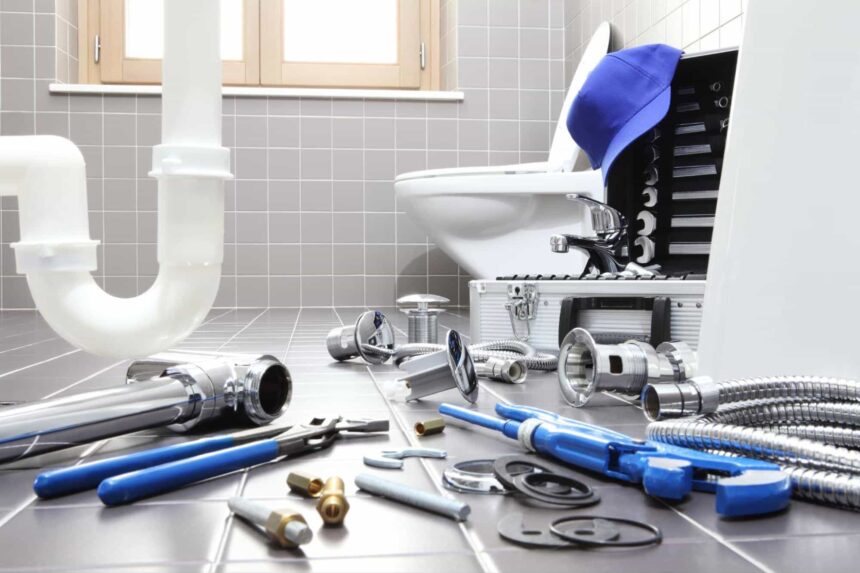Plumbing problems often result in excess water waste and reduced water pressure. If a residential plumber does not fix these issues quickly, you could also face slow drains, foul odors, or water damage. Here are five plumbing problems and how to prevent them:
1. Leaky Faucets
Worn-out washers or loose O-rings often cause leaky faucets. If the valve seat is corroded or the faucets are improperly installed, leaks often occur. Leaking faucets are often identified by:
- Rust on faucets or drain pipes
- Constant dripping
- Mold or mildew growth
- Increased water bills
A residential plumber solves leaks by replacing worn-out parts and tightening faucet components. Regular faucet inspections, installing high-quality parts, and avoiding chemical cleaners can help prevent leaks. Ask a plumber to monitor water flow and lubricate moving parts during an inspection to minimize the risk of leaks.
2. Clogged Drains
The buildup of food particles and hair accumulation often clog drains. Soap scum deposits, grease blockages, and foreign objects can also block drain pipes, resulting in slow water drainage and gurgling noises. A foul smell might emanate from the drains and the likelihood of water overflow increases.
Baking soda and vinegar may offer a temporary drain-cleaning solution until a plumber is available. Professionals use drain snakes or hydro-jetting to dislodge buildup in drains. To prevent frequently clogged drains, install dain screens in kitchen sinks and showers. Avoid pouring grease or large amounts of food down the drain. Scheduling regular plumbing inspections helps catch unexpected clogs like root intrusion.
3. Running Toilets
Running toilets often occur due to a faulty flapper valve, a misaligned chain, or a damaged fill valve. Deterioration of the tank seal can also lead to a running toilet. The first sign of a running toilet is often the constant sound of running water from the toilet tank. This problem is often minor, but the likelihood of overflow increases if left unaddressed. More stress is also placed on your plumbing system, which may produce other issues.
Plumbers eliminate this problem by replacing the flapper valve and adjusting the toilet chain. They may also check the height of the float and tighten the fill valve. Cleaning valve openings helps improve water flow. To prevent a running toilet, inspect the internal mechanisms frequently and avoid using harsh chemicals. Many plumbers also encourage you to avoid flushing non-degradables and keep the toilet lid closed.
4. Burst Pipes
Bust pipes cause sudden flooding that could damage your building’s support structure or interior furnishings. Flooding also increases the potential for mold growth and can disrupt the supply of water to your house. Burst pipes are often caused by:
- Ice: Freezing temperatures can cause water in pipes to expand, pushing against the pipe walls and causing cracks.
- Pressure: Frozen water blocks liquid water from flowing into your pipes, resulting in pressure buildup. This can cause pipes to burst, especially if they are old or corroded.
- Tree roots: Roots may enter exterior pipes, causing cracks or underground bursts.
If a pipe bursts, shut off the water valve immediately and drain the remaining water. Call a plumber to repair this issue quickly. To reduce the likelihood of bursts, insulate your pipes, especially those exposed to low temperatures.
5. Water Heater Issues
A malfunctioning water heater often produces inadequate hot water and makes strange noises. This might be caused by a faulty thermostat, broken heating element, corroded tank liner, or an inconsistent gas supply. These issues interfere with a water heater’s efficiency, potentially raising your utility bills.
Plumbers often flush the system and replace faulty parts to repair a malfunctioning water heater. They can also insulate the heater pipes and adjust the thermostat settings. A plumber may recommend installing a water softener for water heaters prone to large mineral deposits in the pipes. To prevent malfunctions, avoid running the water heater for long periods and monitor sediment buildup.
Work With a Residential Plumber
Fixing minor issues quickly and with high-quality parts helps prevent major plumbing problems. Schedule regular plumbing system inspections and replace any outdated piping, water heaters, or system parts to avoid leaks. Professional plumbers can also assist with garbage disposals and water filtration systems. Contact a residential plumber today to schedule plumbing repair or installation services.






